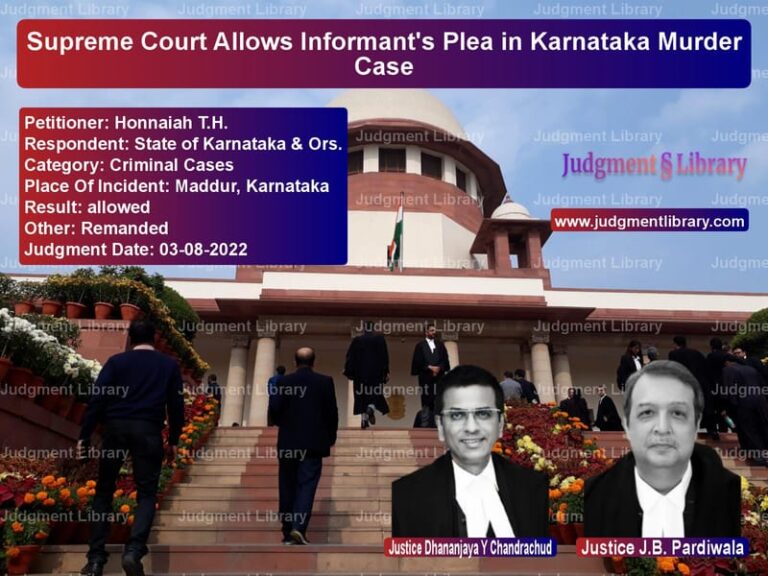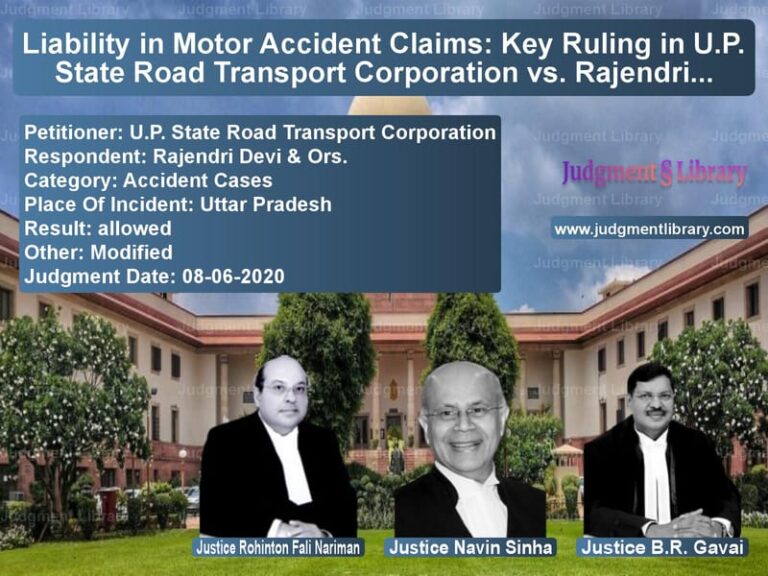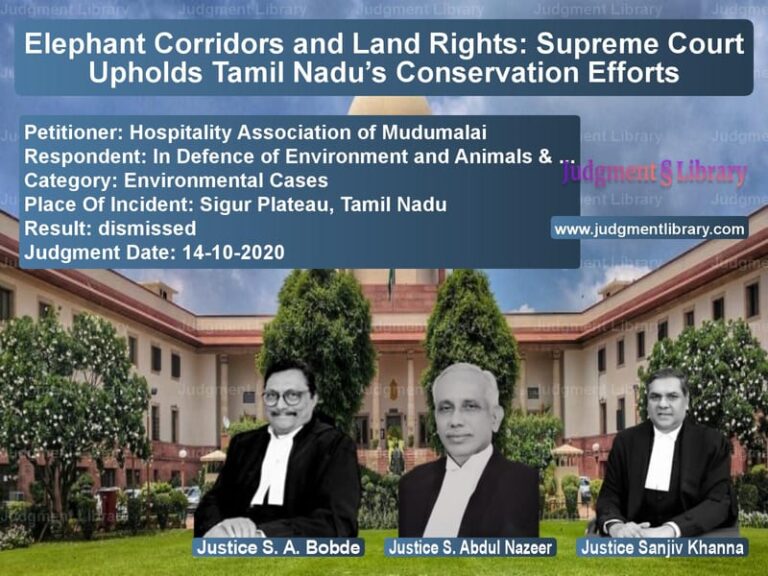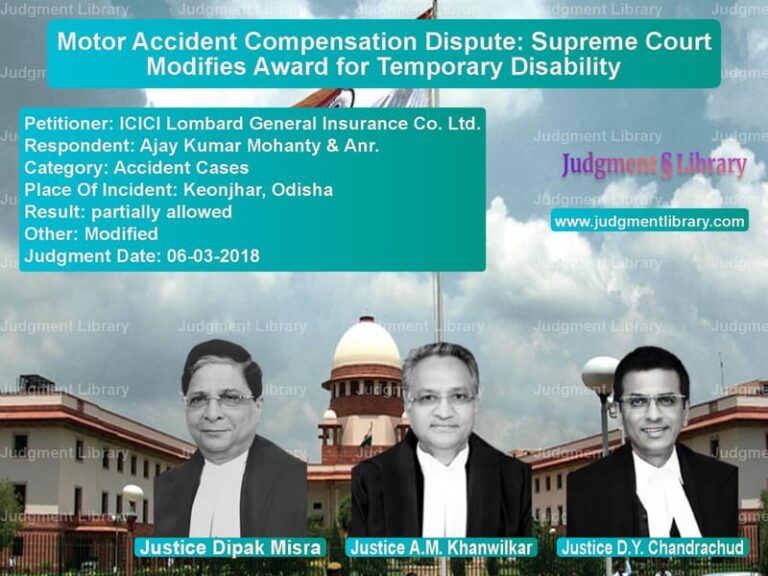Compassionate Employment in Banking: Supreme Court’s Verdict on Indian Bank v. Promila
The case of Indian Bank & Ors. v. Promila & Anr. revolves around the issue of compassionate employment following the demise of a bank employee. The Supreme Court delivered a significant judgment on January 8, 2020, addressing whether the son of a deceased employee was entitled to employment under the compassionate appointment scheme that was in force at the time of his father’s death. This ruling establishes a crucial precedent on how such schemes should be interpreted and whether later amendments to these schemes can impact existing claims.
Background of the Case
Jagdish Raj was employed as a Clerk-cum-Shroff at Indian Bank and was drawing a monthly salary of Rs. 16,486.60 at the time of his death on January 15, 2004. His wife and three minor children were left behind. Following his demise, his family was entitled to terminal benefits amounting to Rs. 5,45,872. However, after deductions for staff housing and vehicle loans, the net payment received by the family was Rs. 2,99,672, along with a monthly pension of Rs. 5,574.12.
On January 24, 2004, the deceased employee’s wife applied for compassionate employment on behalf of their son. However, the son was a minor at that time, which complicated the matter. The dispute arose over which compassionate employment scheme was applicable, as the bank later introduced new schemes modifying the eligibility criteria.
Arguments by the Petitioner (Indian Bank & Ors.)
- The bank contended that compassionate employment is not an inherent right but rather a scheme-based benefit subject to the conditions prevailing at the time of the employee’s death.
- The applicable scheme at the time (April 4, 1979) stipulated that dependents could either opt for compassionate employment or receive full gratuity benefits.
- The dependents had already opted for and received gratuity benefits, thus disqualifying them from seeking compassionate employment.
- Subsequent schemes, including the one introduced in 2004, further restricted eligibility by introducing financial benchmarks, which the family exceeded.
Arguments by the Respondents (Promila & Anr.)
- The respondents argued that the deceased’s son should be granted employment under the compassionate appointment scheme.
- They claimed that the purpose of compassionate employment was to provide financial relief to the bereaved family, and monetary compensation alone could not substitute for job security.
- The bank had allegedly denied them the opportunity to apply under the most beneficial scheme, causing an unfair disadvantage.
Supreme Court’s Judgment
The Supreme Court ruled in favor of Indian Bank, setting aside the Punjab & Haryana High Court’s decision that had granted the respondents Rs. 2 lakh as ex gratia compensation. The key findings of the ruling were:
- The applicable scheme at the time of the employee’s death (April 4, 1979) only permitted compassionate employment if the family did not avail full gratuity benefits, which they did.
- Compassionate employment is not a matter of right but a policy decision subject to government or institutional discretion.
- Subsequent schemes, including those introduced in 2004 and 2005, could not be applied retrospectively to claims arising under the older scheme.
- Even under the new schemes, the family did not meet the eligibility criteria due to their financial standing.
Legal Precedents Cited
- Canara Bank v. M. Mahesh Kumar (2015) – Held that the scheme in force at the time of the employee’s death is the one applicable to compassionate appointment claims.
- State of Himachal Pradesh v. Parkash Chand (2019) – Reaffirmed that courts cannot modify or create new provisions in schemes while exercising judicial review.
Impact of the Judgment
The ruling clarifies that employees’ dependents cannot demand compassionate employment if they have already availed terminal benefits that disqualify them under the prevailing scheme. It also reaffirms that subsequent modifications to such schemes do not apply retrospectively.
The Supreme Court concluded that the respondents’ claim had no legal standing and allowed the appeal filed by Indian Bank.
The ruling carries broad implications for future cases involving compassionate employment in banking and other government institutions. It sets a clear boundary between financial compensation and job security and reiterates that courts cannot interfere in policy decisions.
The Supreme Court emphasized that while sympathy for the family of the deceased is understandable, legal principles must be upheld. The respondents had already availed benefits that disqualified them from seeking additional relief.
Ultimately, the Supreme Court’s verdict reinforces the principle that compassionate employment schemes are discretionary and should be strictly interpreted based on the conditions prevailing at the time of the employee’s death.
Petitioner Name: Indian Bank & Ors..Respondent Name: Promila & Anr..Judgment By: Justice Sanjay Kishan Kaul, Justice K.M. Joseph.Place Of Incident: Indian Bank.Judgment Date: 08-01-2020.
Don’t miss out on the full details! Download the complete judgment in PDF format below and gain valuable insights instantly!
Download Judgment: Indian Bank & Ors. vs Promila & Anr. Supreme Court of India Judgment Dated 08-01-2020.pdf
Direct Downlaod Judgment: Direct downlaod this Judgment
See all petitions in Employment Disputes
See all petitions in Pension and Gratuity
See all petitions in Public Sector Employees
See all petitions in Contractual Employment
See all petitions in Judgment by Sanjay Kishan Kaul
See all petitions in Judgment by K.M. Joseph
See all petitions in allowed
See all petitions in supreme court of India judgments January 2020
See all petitions in 2020 judgments
See all posts in Service Matters Category
See all allowed petitions in Service Matters Category
See all Dismissed petitions in Service Matters Category
See all partially allowed petitions in Service Matters Category







